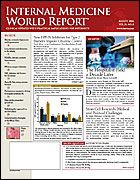Publication
Article
Complementary Therapy at the Mayo Clinic
Author(s):
KEY BISCAYNE, Fla?Three ongoing studies at the Mayo Clinic in Rochester, Minn, are looking at how, or if, complementary and alternative medicine (CAM) can benefit cancer patients, researchers reported at the recent Mayo Clinic's 16th Annual Advances and Controversies in Clinical Nutrition meeting.?
One study is evaluating whether valerian, a medicinal herb, can help improve sleep.
Another study is trying to determine if ginkgo biloba can help reverse the memory changes that are associated with some kinds of chemotherapy.
"And we've just started another study with ginseng, trying to treat fatigue in cancer patients," said Brent A. Bauer, MD, director, Complementary Integrated Medicine Program, Mayo Clinic College of Medicine, Rochester, Minn. "We are trying to study the most common herbs," he added.
"We physicians are recognizing the important role herbs play in the health of our patients, sometimes for good, sometimes for bad," he explained. "As we educate ourselves about herbs, we can then educate our patients and help them make better-informed decisions about the use of herbs and dietary supplements in their healthcare."
Dr Bauer pointed out that the popularity of herbs became apparent about 15 years ago and has heralded important changes in the Western world's "pill-oriented" culture.
Many patients have started taking herbs, sometimes prematurely. "In other words, they are still smoking, they are not exercising, they don't have good nutrition, but they think that if they take enough supplements, vitamins, and herbs, they can counteract all that. It's not a very savvy way of approaching the problem," he said.
Physicians need to know which herbs, vitamins, and supplements their patients are taking and have a good plan of action to steer them in the right direction.?
IMWR
A case in point is St. John's wort, with its potential for benefits as well as risks. Known for thousands of years, this folk remedy is extremely popular in Europe, especially in Germany. This herb can provide effective relief for some people with moderate depression. However, "Where we've seen the challenge is that it also has a profound effect on the metabolism of many other drugs. And that's where people get very serious side effects," Dr Bauer told .
IMWR
Information about herbs and supplements, geared to both patients and physicians, is readily available online. Learning how to distinguish between varieties of the same substance, however, can be challenging (for more information on this topic, see , May 2006.)
Since the Mayo Clinic is considered a bastion of traditional medicine, it may come as a surprise to see its researchers engaged in the study of CAM. But this fits well into Mayo's philosophy-putting the needs of the patient first-said Dr Bauer.
Recognizing that at least 40% of patients at the Mayo Clinic are using some form of CAM, the clinic's response is to investigate which of these therapies are beneficial and which are potentially dangerous, as in the case of drug interactions with medications a patient is already taking.
"The message we are trying to get to our medical students and residents is that they need to make sure they are asking not just about herbs and dietary supplements, but also about all the different practices and modalities that fall into the rubric of CAM," he said.
"If we ask about it, that gives us the opportunity to educate. Not necessarily that we are going to say ?yes' or ?no,' but we can at least make sure that our patients are making well-informed decisions, so they know some of the risks and some of the potential benefits," Dr Bauer concluded.
KEY POINTS
Many patients are continuing to smoke and eat nutritionally deficient food and are using herbals and supplements to compensate for these poor behaviors.
Experts at the Mayo Clinic, the bastion of traditional medicine, are realizing that physicians need to know which herbs, vitamins, and supplements their patients are taking.
They recommend that physicians educate themselves about complementary therapies and their potential drug interactions, so they can help patients avoid potentially serious side effects. ?






